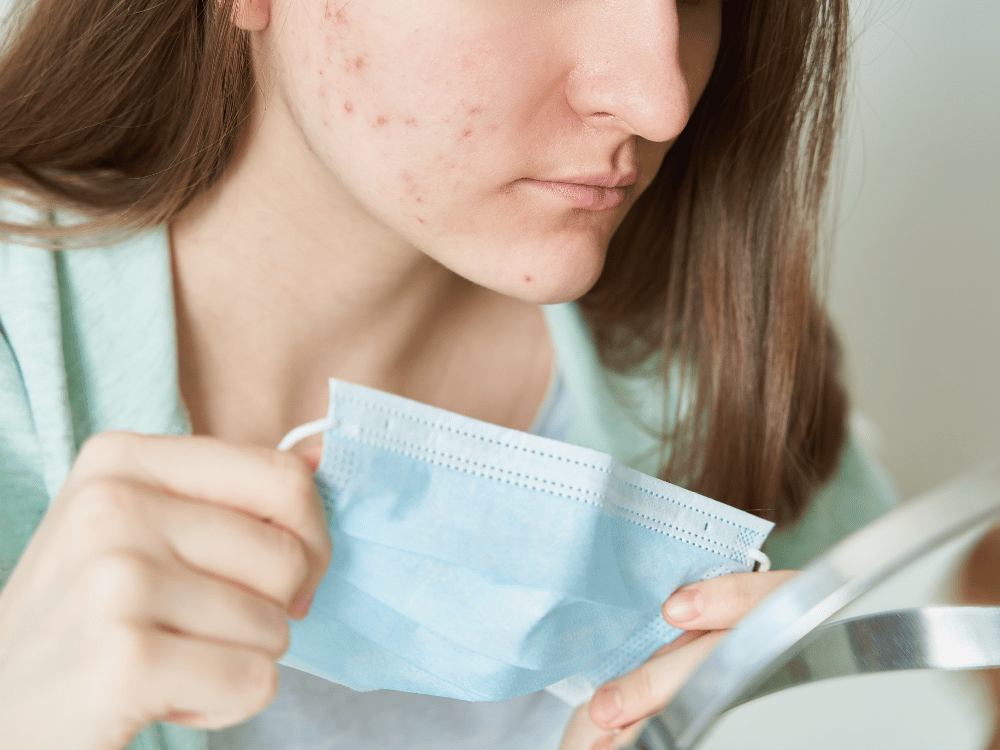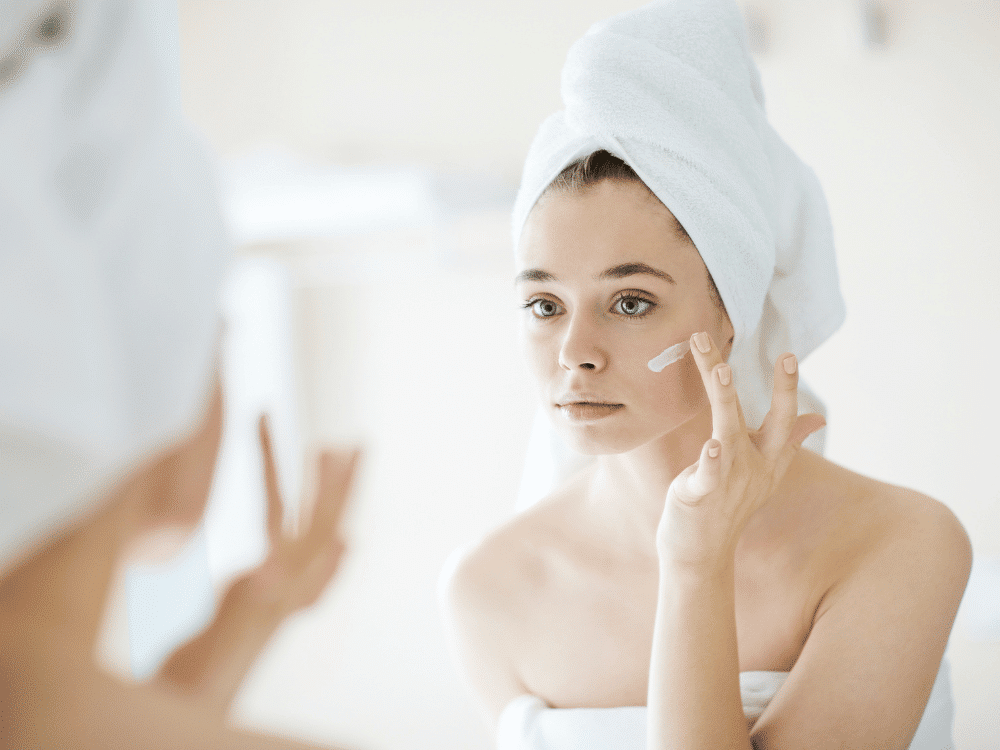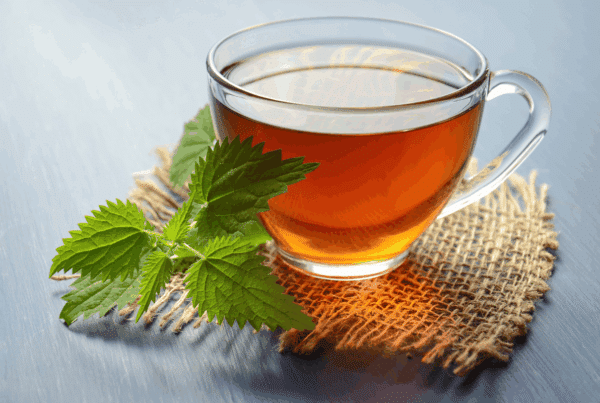The skin, the largest organ of the human body, is a mirror of our internal health and state of the organism. Its beauty and shine depend not only on the external treatments and products we use, but also on what we put into our body.
It has long been believed that diet is key to maintaining health, but only in recent decades has research begun to reveal the complex connections between the food we consume and how it affects the health and appearance of our skin. Scientists are increasingly focused on understanding how certain nutrients, vitamins, minerals and other substances from food can affect collagen production, regulation of sebum, skin moisture and even the occurrence of certain skin problems such as acne, eczema and skin aging.
Acne is one of the most common skin problems that occurs when the skin's oil glands are clogged with oil, dead skin cells and bacteria. The glands produce an oily liquid called sebum. Acne often appears in adolescence, but it can also occur in adults. Factors such as hormonal changes, genetics, stress, poor diet and inadequate skin care can contribute to their appearance.
How can food affect skin health?
Certain foods raise blood sugar more quickly than others. When your blood sugar rises rapidly, it causes the body to release a hormone called insulin. Excess insulin in the blood can cause your sebaceous glands to produce more sebum, increasing your risk of acne. Excessive sugar intake can affect the hormonal balance in the body, which can worsen acne symptoms and inflammatory processes in the body.

How can diet affect the appearance of acne?
The effects of dairy products on acne and skin are the subject of research and individual response may vary.
Here are some facts about how dairy products can affect acne and skin:
- Dairy products, such as milk, cheese and yogurt, can be a source of hormones that occur naturally in cow's milk. These hormones can affect sebum production and make acne worse in some people.
- Dairy products have a relatively high glycemic index, which means they can cause a rapid rise in blood sugar levels. This can affect hormonal balance and make acne worse.
- Dairy products may contain certain proteins, such as casein, that are associated with inflammation and may exacerbate inflammatory reactions in the skin.
- People who have lactose intolerance, ie. sugar present in dairy products, they may have problems with acne worsening when they consume these products.
- Some people may notice an improvement in their skin when they avoid dairy, while others may notice no change.
- It is important to note that every body reacts differently to nutrition, so individual testing and monitoring of skin reactions is important in order to determine the personal impact of dairy products.
- There are alternatives to dairy products, such as plant-based milks (almond, soy, coconut, etc.) and plant-based dairy products, that you can try if you find that dairy makes your acne worse.
- The quality and composition of dairy products can vary, so choose those that are natural, organic, or without added hormones and antibiotics, if you choose to consume them.
Processed food and its effect on facial skin
During the intake of unhealthy and processed food, certain hormones are produced that can have a negative effect on the skin:
Insulin: Eating large amounts of sugar and carbohydrates with a high glycemic index can cause a rapid rise in blood sugar levels and increased insulin secretion. High insulin levels can affect sebum secretion and worsen acne.
IGF-1 (insulin-like growth factor): IGF-1 is a hormone associated with cell growth and increased sebum secretion. Eating junk food can increase the level of IGF-1 in the body, which can contribute to worsening acne.
Testosterone: Eating junk food can affect hormone balance, including increasing testosterone levels. A high level of testosterone can negatively affect the condition of our skin.
Proinflammatory cytokines: Junk foods rich in trans fats, refined oils and high levels of omega-6 fatty acids can increase the level of pro-inflammatory cytokines in the body. These cytokines can cause inflammatory processes in the skin.
What foods help us reduce the risk of developing acne?
Eating nutritious foods can reduce the risk of developing acne. Here is a list of what you should eat:
- Whole grains: whole grain bread, brown rice, quinoa
- Legumes: beans, peas and lentils
- Fresh fruit: seasonal fruits, apple, pear, plum, peach, sour cherry, citrus, kiwi, berries, blueberry, currant, raspberry, blackberry, chokeberry... anything with antioxidants
- Vegetables: tomatoes, spinach and other dark green and leafy vegetables
- Zinc: pumpkin seeds, cashews, beef, turkey, lentils, seafood
- Omega-3: eggs, fish - salmon, mackerel and other types of fatty fish
- Provitamin A: yellow and orange fruits and vegetables – carrots, apricots and sweet potatoes/sweet potatoes
- Vitamin E: walnuts, hazelnuts, almonds, cashews... so, nuts
Researchers in a study conducted in South Korea found that following a low glycemic load for 10 weeks can lead to significant improvement in acne.
Foods that cause oily skin
Salty food
Most of us cannot imagine our meals without salt. It is an integral factor that contributes to our taste, diet and overall health. Excess salt causes dehydration, causing our skin to produce more oil to counteract the lack of water. As long as you consume salt in moderation, you won't have problems with oily skin.
Alcohol
Celebrating holidays and milestones is usually accompanied by large amounts of alcohol. In addition to damaging your organs, alcohol also damages your skin. Like excess salt, it dries out your skin, causing it to produce more oil to compensate for dehydration. It also produces sweat that clogs the pores.
Red meat
Sausages and bacon are well-known and favorite breakfast foods. The problem is that these foods are high in saturated fat, which increases inflammation in the skin. This leads to the formation of excess oil, which leads to an oily face.

Skin problems and nutrition for their prevention
Wrinkles
The primary cause of wrinkles is simple but inevitable - the weather, but your diet is also an important factor that affects your skin in all aspects. Luckily, you can build your way to younger looking skin with food.
Here's what you can eat:
Use carb alternatives. Quinoa, gluten-free oats, and sweet potatoes are good substitutes. Additionally, choose foods with a glycemic index below 55.
Satisfy your sweet tooth by switching to sugar-free treats and foods with natural sugar.
Replace French fries with baked sweet potatoes. Sweet potatoes, or sweet potatoes, are known for being rich in copper, which helps fight aging. This way, you can continue to enjoy your favorite snack, only in a healthier way.
Replace butter and margarine with olive oil and avocado. Avocados are rich in anti-aging antioxidants, which makes them even better when spread on toast.
Golden milk is every grandmother's secret drink. Its main ingredient, turmeric, is not only rich in antioxidants, but also a powerful anti-aging compound.
Here is a simple recipe for golden milk.
Ingredients:
- 1 cup milk of your choice (cow's, almond, coconut, etc.)
- 1 teaspoon turmeric powder
- 1/2 teaspoon cinnamon powder
- A pinch of black pepper
- 1 teaspoon of honey or sweetener of choice
- A little coconut oil (optional)
Instructions:
Put the milk in a saucepan and heat it over medium heat. Be careful not to boil.
Add turmeric, cinnamon and black pepper to the heated milk. Mix all the ingredients well.
Reduce the heat and let it simmer gently for about 10 minutes. This will help the flavors meld.
Remove the pan from the stove and let it cool slightly.
Add honey or sweetener as desired and mix well.
If you want, you can add a small amount of coconut oil to increase the absorption of curcumin.
Golden milk is ready to serve! You can drink it while it's still warm.
Note: Pay attention to possible allergies or intolerance to certain ingredients. Also, consult a doctor or nutritionist if you have health problems or use certain medications before consuming golden milk regularly.
Sensitive skin
Skin that reacts to certain foods. Individual food intolerances can vary, but some common triggers are gluten, dairy, citrus fruits, eggs, tree nuts. Identifying and avoiding potential triggers can help soothe sensitive skin
Dry skin
Hydration is key for dry skin. Foods rich in healthy fats, such as avocados, olive oil and walnuts can help keep skin hydrated from the inside out. Also, it is important to drink enough water to keep the skin hydrated.
How do vitamins and minerals affect skin health?
Vitamins and minerals are essential for the proper functioning of the body, including the skin. Vitamin C, for example, has a strong antioxidant effect that helps fight free radicals and preserve collagen - the protein responsible for skin firmness. Vitamin E also provides antioxidant protection, while vitamin A supports skin cell renewal, contributing to smoothness and elasticity. The importance of minerals such as zinc and selenium cannot be ignored either, as they are crucial for cell regeneration, inflammation control and maintaining sebum balance.

How can Omega-3 fatty acids help the skin?
Omega-3 fatty acids, which are often found in fish such as salmon, walnuts, flaxseeds, etc., play a key role in maintaining skin health. These fatty acids have an anti-inflammatory effect, which means they can reduce skin inflammation, soothe redness and irritation, and contribute to overall skin health. Omega-3 fatty acids support skin hydration, making it softer and more elastic.
The effect of hydration and water intake on the skin
Proper hydration is key to skin health. Insufficient water intake can lead to dehydration, which will make the skin dry, rough and less elastic. Water helps maintain optimal moisture balance in skin cells, which supports its glow and smoothness. In addition to water intake, fruits and vegetables with a high water content, such as cucumbers, watermelon, beets, can also contribute to skin hydration.
Can diet slow down the skin aging process?
The skin's aging process is natural, but diet can have a significant impact on how quickly and how the skin ages. Antioxidants, such as vitamins C and E and other phytonutrients present in fruits and vegetables, help fight free radicals that cause oxidative stress and accelerate skin aging. Also, foods rich in collagen, such as chicken skin or beef broth, can support the production of collagen in the skin, thus maintaining its firmness and elasticity.
How can allergens and food intolerance affect the skin?
Allergens and food intolerances can cause various skin reactions. For example, people who are intolerant to gluten may experience rashes or eczema in response to consuming gluten. Similarly, certain allergens present in food can cause itching or redness in people prone to allergic reactions.
Recognizing these reactions can help identify potential triggers and adjust your diet to maintain skin health.
The connection between nutrition and skin health is complex and comprehensive. Our skin reflects what we put into our body, reflected in its glow, texture and resistance to aging. A proper diet rich in a variety of fruits and vegetables, omega-3 fatty acids, vitamins and minerals plays a key role in supporting the skin and its health. Each person is unique, so it's important to experiment and monitor how certain foods affect your skin. With a properly balanced diet, hydration and careful selection of foods, we can slow down the aging process, reduce the risk of problems such as acne and eczema, and keep the skin healthy, radiant and youthful.
Finally, this comprehensive look at the effects of food on the skin reminds us that beauty really does come from within. Taking care of your body, including proper nutrition, lays the foundation for healthy and glowing skin that will reflect our overall health and well-being.









